Health Reporter
The Africa Centre for Diseases Control (Africa CDC) has launched a robust Mpox surveillance protocol to enhance existing surveillance systems across African Union member states.
This initiative aims to identify at-risk populations, understand the epidemiology, natural history, and risk factors associated with Mpox, and facilitate prompt detection and reporting of cases.
“The new protocol recommends enhancing surveillance within communities, health facilities, and points of entry, and linking these efforts to national and regional laboratories for confirmation,” said Africa CDC.
The protocol outlines clear guidelines for reporting timelines, data validation, and security measures to ensure accuracy, consistency, and confidentiality. Non-endemic countries are urged to report timely and probable cases within 24 hours, while endemic countries should report suspected, probable, and confirmed cases weekly.
“The submission of case-based information should be done by the national surveillance or mpox focal point(s), who will compile the reports and upload into the EMS or forward it to the Africa CDC,” said Africa CDC.
The protocol emphasizes the need for training healthcare workers on standard WHO case definitions for mpox, allowing for prompt detection and appropriate classification of cases. National levels should adopt the standard WHO case definition and disseminate it to all facilities to facilitate detection and reporting.
“Robust feedback mechanisms will be established to facilitate continuous communication and coordination between national, regional, and continental levels, enhancing the effectiveness of data management and ensuring that guidelines are consistently applied across all levels,” said Africa CDC.
Countries are encouraged to perform routine monitoring of their surveillance systems to evaluate performance and identify areas for improvement. Existing Event-Based Surveillance efforts can be leveraged to support early detection and reporting of mpox-related events.
“The Africa CDC will use this data to mobilize resources, guide public health action, and establish a continental mpox dashboard to improve awareness and support real-time monitoring of the mpox situation on the continent,” said Africa CDC.
Zim GBC News©2024


